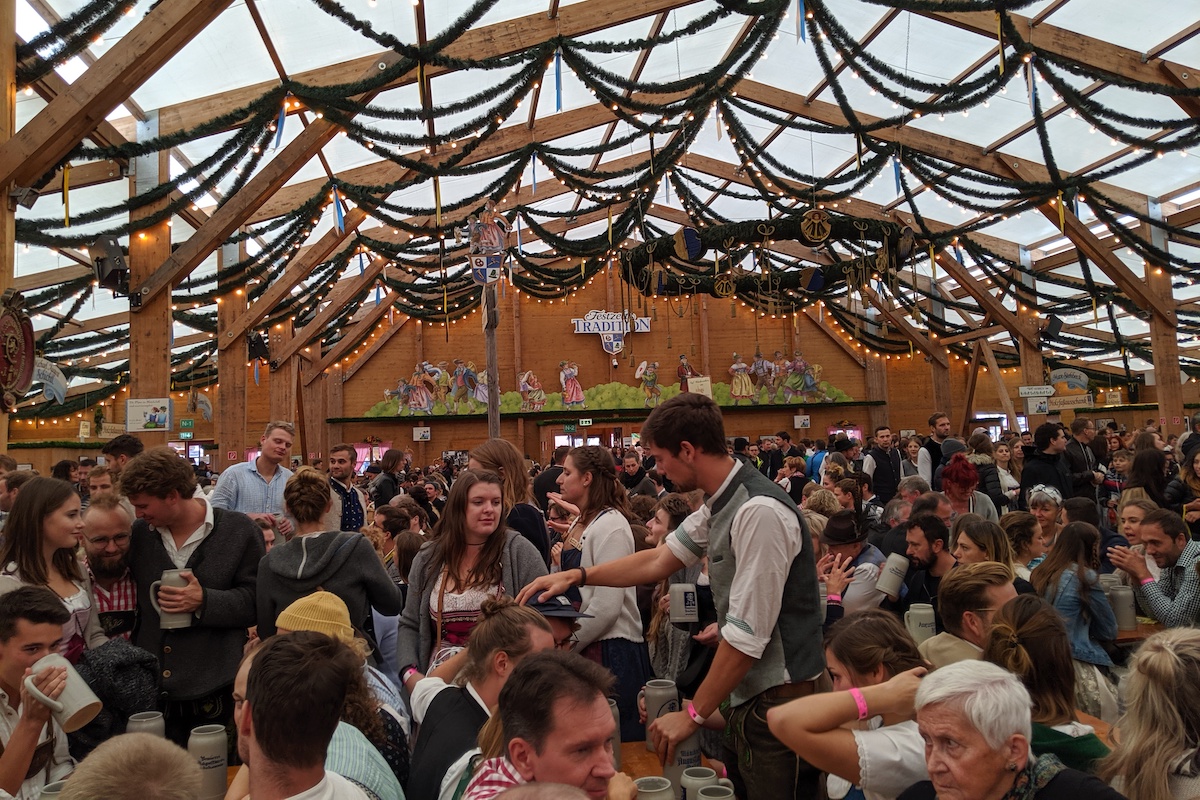
Ready for Oktoberfest? All About Its History & What to Expect at Oktoberfest Munich 2025!
By: Sarah Stone
Skip to Section
Article Summary
What started as a royal wedding party in 1810 has turned into the world’s biggest beer bash, complete with lederhosen, brass bands, and enough pretzels to feed a small army. Oktoberfest brings over 6 million people to Munich each year for two weeks of Bavarian fun.
This guide walks you through the history of how Crown Prince Ludwig’s wedding celebration became an annual tradition that survived wars, pandemics, and countless hangovers. You’ll learn what to expect from the massive tent halls, the strict beer purity laws that govern what gets served, and the traditional foods that pair perfectly with a one-liter Maß. The article covers practical tips for scoring seats, getting around Munich, and making the most of your visit to this legendary festival.
- The festival started as a one-day royal wedding celebration in 1810 and now runs for two weeks from late September to early October
- All beer served follows the 1516 Beer Purity Law, with six official breweries providing authentic Bavarian brews in one-liter glass mugs
- Tent reservations fill up months in advance, but you can still find spots by arriving early or checking out the less crowded Oide Wiesn area
- Traditional Bavarian clothing like lederhosen and dirndls are popular but not required for enjoying the festivities
- Family-friendly activities include rides, games, and special discount days designed for visitors with children
Oktoberfest is the world’s largest Volksfest (folk festival) and is best known for its beer—but it’s also host to traditional food, music, and festivities!
Let’s dive into a short history of this world-famous celebration and what you can expect as a participant.
Origins of Oktoberfest
Oktoberfest began on October 12, 1810, in Munich, Bavaria, Germany. It was initially a celebration of the marriage of Crown Prince Ludwig—later King Ludwig I—to Princess Therese of Saxe-Hildburghausen. The citizens of Munich were invited to attend the festivities in the fields in front of the city gates—a significant gesture during that time.

The fields where this took place were named Theresienwiese (“Therese’s Meadow”) to honor the Crown Princess. The expansive site is now within Munich’s city limits due to the area’s growth over the years, and in fact, the Oktoberfest celebrations still take place in this spot! This is why locals in Munich often refer to Oktoberfest as “Wiesn.”
- Want to become a local? Learn about Germany citizenship by descent!
The first Oktoberfest ended with a horse race in the presence of the Royal Family, and was so popular that it was decided the party should be repeated the following year—and then again, and so on. In 1811, an addition to the horse races was made: a show to promote Bavarian agriculture. Beer was added by the late 1810s, and a little before 1900, the stands evolved into tents and massive halls capable of holding thousands of participants. Over the years, more attractions and events have been added, such as a carousel, swings, games, and a traditional riflemen’s parade with costumes, bands, and animals.
And while Oktoberfest was originally a one-day event, it has since become an extended festival lasting about two weeks each year. This year, the 190th Oktoberfest runs from September 20 through October 5.
Challenges and Changes to Oktoberfest
Oktoberfest has not been celebrated without interruptions.
Due to various circumstances, such as wars and epidemics, it has been canceled more than 20 times. A few of these include the Napoleonic Wars, cholera outbreaks throughout Europe, the Austro-Prussian War, the Franco-Prussian War, WWI and recovery, hyperinflation, WWII and recovery, and most recently, the COVID pandemic. During some recovery periods, a smaller version of Oktoberfest was celebrated more as a toned-down autumn festival.
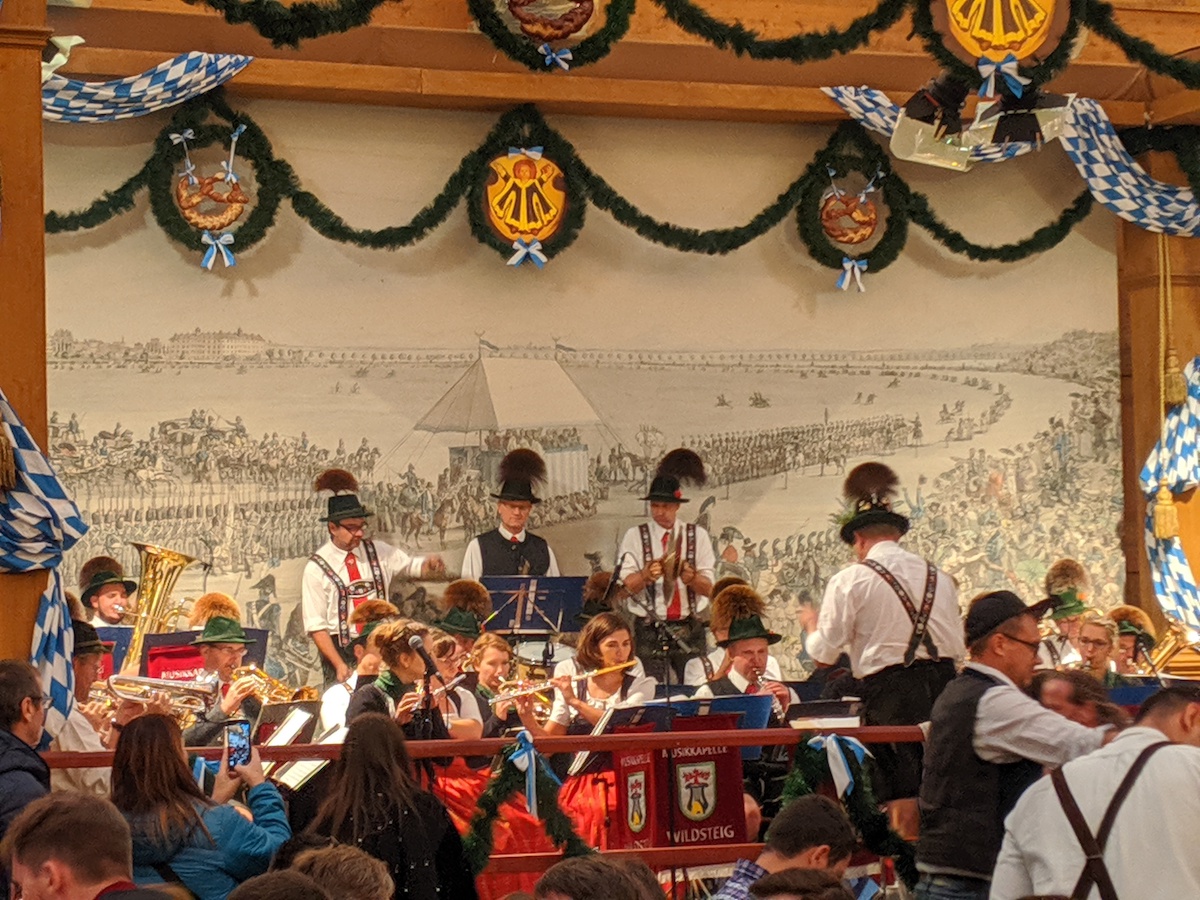
Band playing a mix of traditional and contemporary music
The timing of the Oktoberfest celebration has also changed through the years—of course we know that the one-day festival has been lengthened to a couple of weeks, but it also was moved to start in late September rather than October, as the weather is more pleasant and just a bit warmer during this time.
Safety measures also have ramped up since Oktoberfest’s beginnings. There has been a move to swap from heavy glass beer mugs to plastic ones, though traditionalists believe it takes away from the authenticity of the experience. Bag checks, CCTV surveillance, and barriers are also installed around the festival’s perimeter. Medical tents have also been added to help partiers who’ve had too much.
What to Expect at Oktoberfest Today
The Tents
Oktoberfest 2025 takes place from Saturday, September 20 through Sunday, October 5. The entire festival attracts over 6 million visitors from all over the world each year, and it is on a massive fairground, which gets more crowded on weekends. Seating can be scarce in certain tents and during peak times, so if you’re visiting with a group and want guaranteed seating, reservations are available at individual tents, though you’ll want to get started on choosing your tent and getting your reservation months in advance.
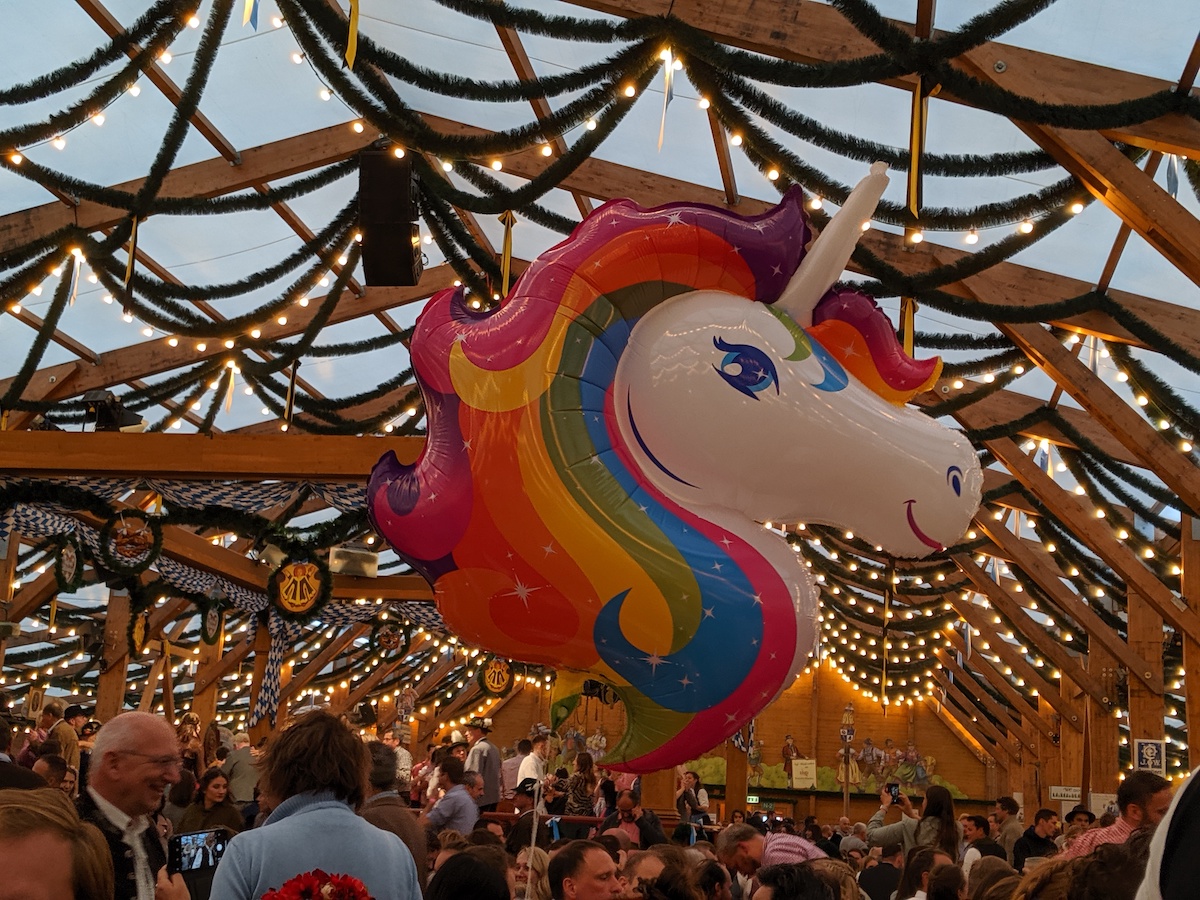
A Lisa Frank unicorn at Oktoberfest 2019—photo by Sarah Stone, Frayed Passport
Or do as I did and show up, get adopted by a group of locals, and tag along with them to a spot they’ve reserved. We also went to a tent in Oide Wiesn, or Old Oktoberfest, because the 4 Euro fee to get in is just enough to keep the area from getting too crazy and crowded!
Food and Drink
The types of beers you can choose from at the Oktoberfest event in Munich all adhere to the Reinheitsgebot, or the Beer Purity Law of 1516. This law initially allowed only for water, barley, and hops in the brewing process, with yeast added to the list later on. You’ll find Augustiner, Paulaner, Spaten-Franziskaner, Löwenbräu, Hacker-Pschorr, and Hofbräu at the festivities. Most beer is served in a Maß, or a one-liter glass mug.
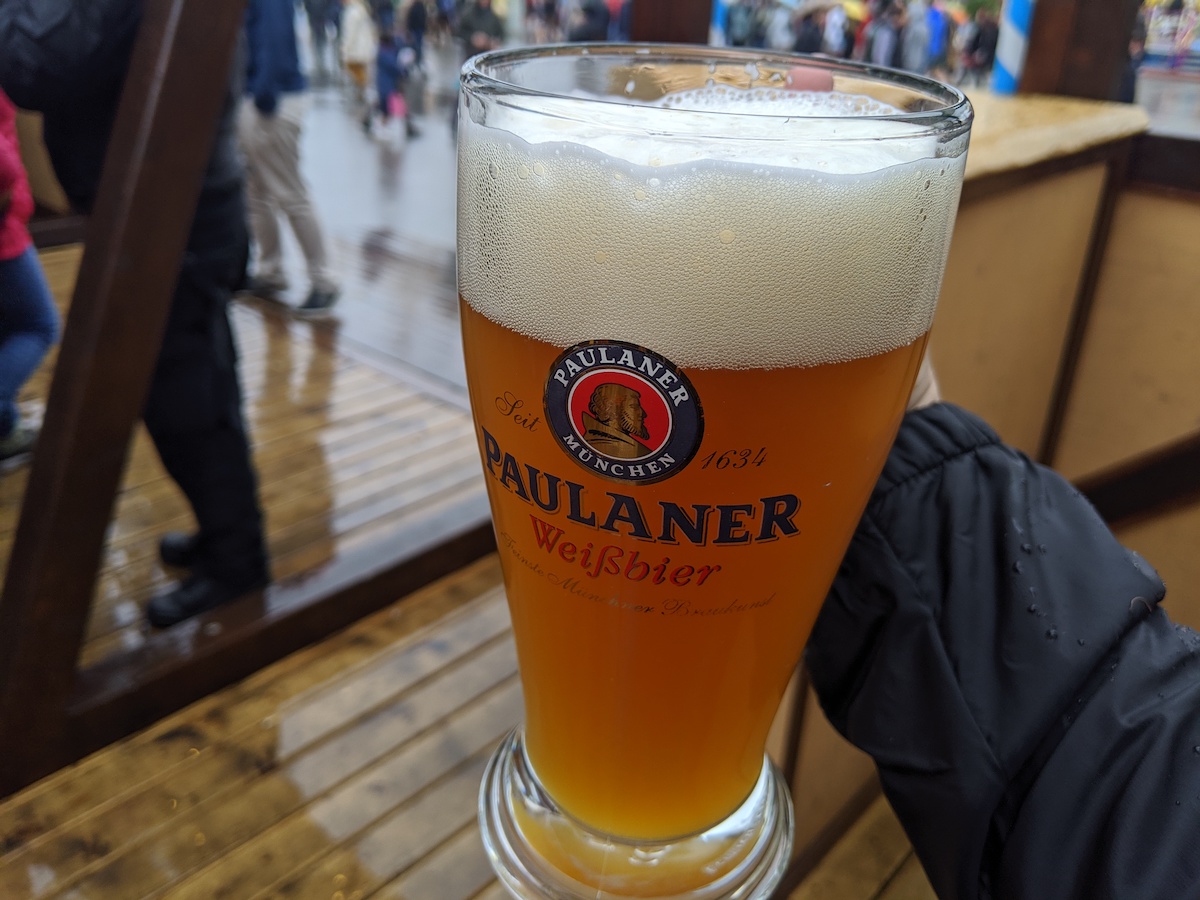
My first beer at Oktoberfest Munich—photo by Sarah Stone, Frayed Passport
In addition to the beer, there’s excellent fair food at Oktoberfest, including pretzels, Weisswurst (white sausage), Hendl (roasted chicken), Schweinshaxe (roasted pork knuckle), and different pastries.
See and Do
Traveling around the festivities, you’ll run into many people wearing traditional Bavarian attire. Men might wear Lederhosen with checkered shirts, while women might wear Dirndls—you can rent these for yourself if you’re interested! But if you decide not to wear something traditional, regular clothes are perfectly fine.
You’ll hear traditional Bavarian music everywhere in Oktoberfest, with each tent having its own band—in addition to folk music, bands will play covers of popular tunes, and of course, partiers have their favorite drinking songs!
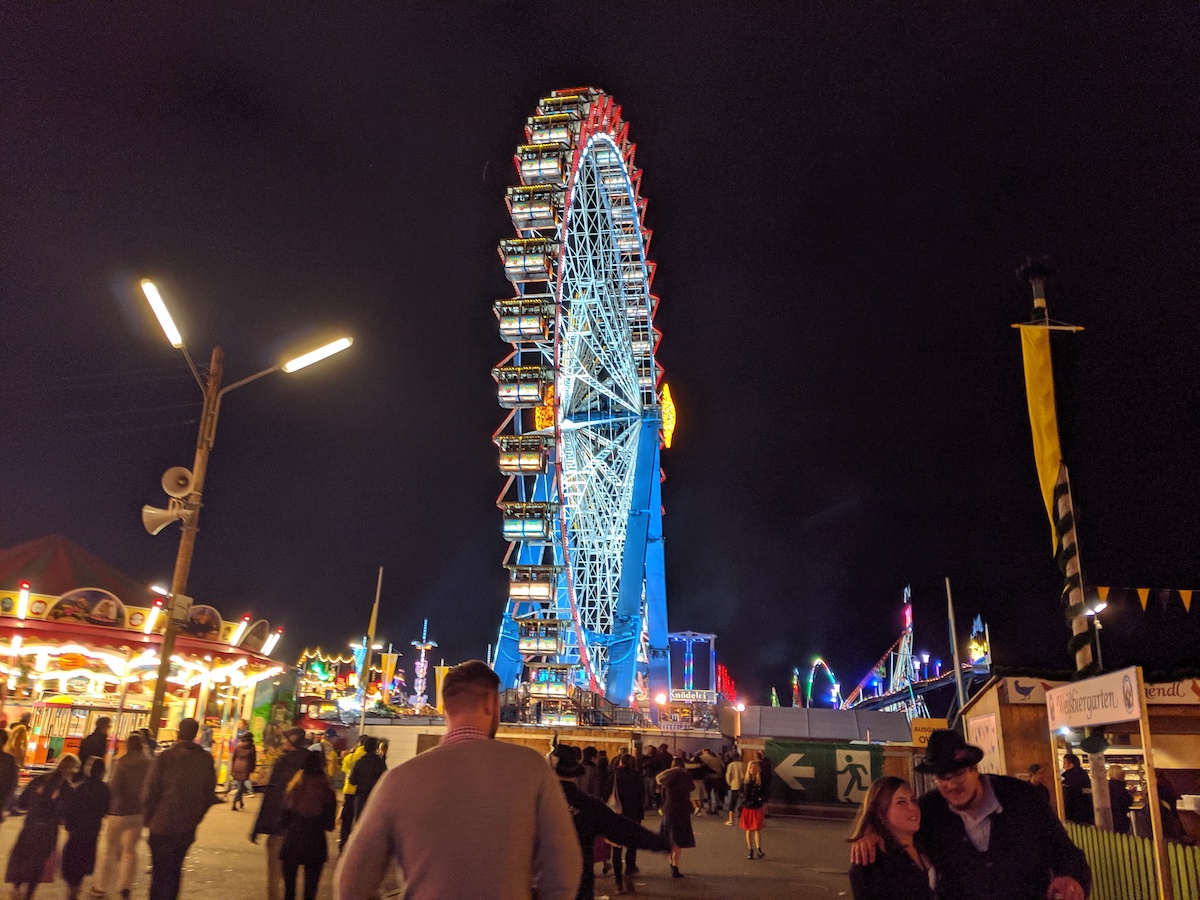
Ferris wheel at Oide Wiesn—photo by Sarah Stone, Frayed Passport
Around the fair, there are rides—like a carousel and a Ferris wheel—plus games and other activities. It’s family-friendly, so if you have little ones, check out the discounted family days, where you can enjoy the rides, food, and tents at a lower rate and with smaller crowds.
Quick Tips:
- Book your hotel or other accommodation well in advance—this is an absolutely enormous event, and you don’t want to get stuck far away or with a bad rate!
- Bring cash with you, and try to stop at an ATM before entering the festival because the lines can get super long.
- Respect the local customs and traditions, and don’t drink so much that you lose track of yourself and your surroundings.
- Public transport in the area is definitely the way to go here—even if you’re new to using a metro system, Munich’s is very easy to navigate.
- Check the weather! It can get a bit chilly and rainy, so be sure to bring a jacket.
About the Author
 As the editor-in-chief of Frayed Passport, my goal is to help you build a lifestyle that lets you travel the world whenever you want and however long you want, and not worry about where your next paycheck will come from. I've been to 20+ countries and five continents, lived for years as a full-time digital nomad, and have worked completely remotely since 2015. If you would like to share your story with our community, or partner with Frayed Passport, get in touch with me using the form on our About page.
As the editor-in-chief of Frayed Passport, my goal is to help you build a lifestyle that lets you travel the world whenever you want and however long you want, and not worry about where your next paycheck will come from. I've been to 20+ countries and five continents, lived for years as a full-time digital nomad, and have worked completely remotely since 2015. If you would like to share your story with our community, or partner with Frayed Passport, get in touch with me using the form on our About page.Images courtesy of the author.
Information published on this website and across our networks can change over time. Stories and recommendations reflect the subjective opinions of our writers. You should consult multiple sources to ensure you have the most current, safe, and correct details for your own research and plans.
Frayed Passport is a participant in the Amazon Associates Program, an affiliate advertising program designed to provide a means for sites to earn advertising fees by advertising and linking to Amazon.com. We also may share links to other affiliates and sponsors in articles across our website.




